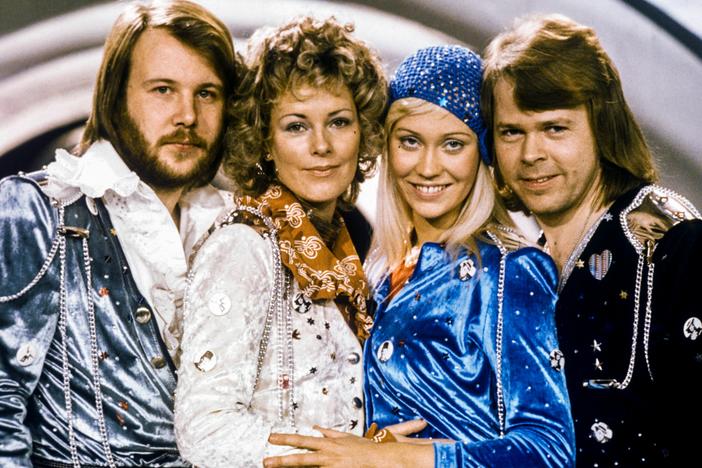Section Branding
Header Content
Understanding the joy that many find in sadness
Primary Content
Why are humans attracted to art that combines sadness and beauty? A brain scientist says sadness has benefits like helping elicit empathy and purging negative emotion.
Transcript
JUANA SUMMERS, HOST:
Sadness is more than just a negative emotion. It can be beautiful.
(SOUNDBITE OF CLIFF MASTERSON'S "BEAUTIFUL SADNESS")
SUMMERS: NPR's Jon Hamilton looks at why we are attracted to art that combines sadness and beauty.
(SOUNDBITE OF CLIFF MASTERSON'S "BEAUTIFUL SADNESS")
JON HAMILTON, BYLINE: This adagio was composed by Cliff Masterson, who lives and works in London.
CLIFF MASTERSON: When I wrote it, the sort of feeling of the music was sad, but yet there was this beautiful melody that sat on top.
HAMILTON: It's called "Beautiful Sadness." And Masterson says it follows the rules of musical melancholy - long, slow phrases, chords that stay in a narrow range.
MASTERSON: Obviously, it's in a minor key, and it never strays far from that minor key home position.
HAMILTON: It even features a violin - the orchestral expression of human sorrow.
(SOUNDBITE OF CLIFF MASTERSON'S "BEAUTIFUL SADNESS")
MASTERSON: It's one of the few instruments where I think you can get so much personality. The intonation is entirely yours. The vibrato is entirely yours. And it can be very much a voice in the orchestra.
HAMILTON: Yet all of these efforts to evoke sadness are also meant to entice a listener. After all, Masterson composed this piece for Audio Network, a service that provides music to clients like Netflix and Pepsi.
MASTERSON: There's a lot of sad songs out there - sort of very sad music. And people enjoy listening to it, and they get a pleasure from it, I think.
HAMILTON: Because the sadness is a part of something beautiful. Matt Sachs is a brain scientist at Columbia University who studies this phenomenon.
MATT SACHS: Pleasurable sadness is what we call it - this attraction to this negative emotion that we're kind of designed to want to avoid in everyday life. But in aesthetics and in art, we actively seek it out.
HAMILTON: Something artists have known pretty much forever. In the 1800s, the poet John Keats wrote about the tale of pleasing woe. In the 1990s, songwriter Tom Waits named an album "Beautiful Maladies." Sachs says there are reasons our species evolved a taste for pleasurable sadness.
SACHS: It allows us to experience the benefits that sadness brings, such as eliciting empathy, such as connecting with others, such as purging a negative emotion, without actually having to go through the loss that is typically associated with it.
HAMILTON: Sachs says vicarious sadness can make a person more realistic.
(SOUNDBITE OF SONG, "MISS MISERY")
ELLIOTT SMITH: (Singing) I'll fake it through the day.
HAMILTON: And it can bring solace.
SACHS: When I'm sad and I listen to Elliott Smith, I feel less alone. I feel like he understands what I'm going through, and that connection is then the psychological benefit or the main thing.
HAMILTON: Pleasurable sadness appears to be most pronounced in people with lots of empathy, especially a component of empathy known as fantasy. This refers to a person's ability to identify closely with fictional characters in a narrative.
SACHS: And even though music doesn't always have a strong narrative or a strong character, this category of empathy tends to be very strongly correlated with the enjoying of sad music.
HAMILTON: Cliff Masterson, the composer, says in movies, music can actually propel a narrative and take on a persona.
MASTERSON: Composers, particularly in the last 30 or 40 years, have done a fantastic job of being that unseen character in films.
HAMILTON: Masterson says that's clearly the case in the movie "E.T.," where director Steven Spielberg worked closely with composer John Williams.
MASTERSON: Even now, you know, at the ripe old age I am, I cannot watch that film without crying. And it's a lot to do with the music.
(SOUNDBITE OF JOHN WILLIAMS' "LOSING E.T.")
HAMILTON: Pleasurable sadness is even present in comedies, like the animated series, "South Park." Take the scene where the character Butters, a fourth-grader, has just been dumped by his girlfriend. The goth kids try to console him.
(SOUNDBITE OF TV SHOW, "SOUTH PARK")
MATT STONE: (As Goth Kid #1) I guess you can join up with us if you want.
TREY PARKER: (As Goth Kid #2) Yeah. We're going to go to the graveyard and write poems about death and how pointless life is.
HAMILTON: Butters says, no thanks. He values his sadness.
(SOUNDBITE OF TV SHOW, "SOUTH PARK")
STONE: (As Butters) It makes me feel alive, you know? It makes me feel human. The only way I could feel this right now is if I felt something really good before. So I have to take the bad with the good. So I guess what I'm feeling is like a beautiful sadness. I guess that sounds stupid.
HAMILTON: Or maybe profound.
Jon Hamilton, NPR News.
(SOUNDBITE OF SONG, "FAMILY")
DAR WILLIAMS: (Singing) Can you fix this? It's a broken heart. It was fine, but it just fell apart. It was mine, but now I give it to you. 'Cause you can fix it. You know what to do. Let your love cover me like a pair of angel wings. You are my family. Transcript provided by NPR, Copyright NPR.
Bottom Content



